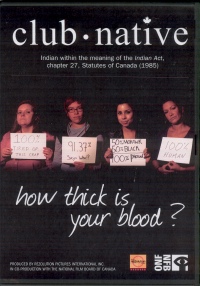| ________________
CM . . .
. Volume XVI Number 28. . . .March 26, 2010
What does it mean to be “Indian within the meaning of the Indian Act, chapter 27, Statutes of Canada (1985)?” The four women on the front cover of this NFB production offer four different answers. Waneek Horn-Miller, former Olympic athlete, is proudly Mohawk; she holds a placard stating that she is “100% human.” Lauren Jiles, an articulate young performance arts student, is “50% Mohawk, 50% Black, and 100% proud.” Tiffany Deer, sister of Tracey Deer, the maker of the film, is 91.37% Mohawk, but then asks “Says who!?” And Sharon Schurman, blond, blue-eyed, the daughter of a Mohawk mother and “regular Canadian guy” is “100% tired of this crap”; apparently, somewhere, there’s a government document indicating that she is only 37% Mohawk. What’s with these percentages, and why should it matter? Well, in Kahnawake, the Mohawk reserve located just outside of Montréal, it seems to matter a great deal. According to the First Indian Act (1876), one’s status (i.e. registration as an Indian, under the terms of the Act) was determined by one’s parentage. A First Nations woman who married a man who was not, lost her entitlements, and by extension, so did her children. However, regardless of race or ethnicity, if a woman married a First Nations man, she gained “status” under the terms of the Act. Completely unfair, and blatantly discriminatory, this situation continued until 1985. With the passage of Bill C-31, opportunities arose so that individuals who had lost their status could apply to do so. It all sounds great, on paper, but because First Nations peoples gained the right to determine membership, and thus, status under the Act, discrimination has continued. Incredibly enough, not having a high enough “percentage” of tribal lineage makes a person ineligible to be “part of the club,” as it were. That’s why Sharen Schurman is so angry: Kahnawake is her home, she participates and lives in her community, but when she dies, she cannot be buried in its cemetery because of the “percentage” of her bloodline which is white. Nevertheless, there are people in the community who are extremely militant about the issue of “quantum” or “percentage” and see those who marry non-Mohawk as genetic traitors, diluting the purity of the Mohawk bloodline. As one young woman points out, continued intermarriage will exterminate the Mohawk nation. But, both Tiffany Deer and Waneek Horn-Miller fall in love with men who are white, and they experience extraordinary emotional difficulty about following their hearts, even as they remain strongly committed to the values of their culture. Meanwhile, Lauren Jiles, the daughter of a black American military man and a Mohawk Canadian mother, is working her way through the process of applying to gain full membership in the Mohawk nation. All four women are intelligent, articulate, and incisive; they are forthright and candid, and don’t hold back. Additionally, we hear from other members of the Kahnwake community, and it is clear that opinions about membership eligibility for “club native” range from the totally exclusionary to the completely accepting. While concerns about “marrying out” are present in many ethnic communities, the entitlements which come with “status” make it a particularly contentious issue for First Nations peoples. Although one might expect that the audience for Club Native is most likely to be high school students in Aboriginal Studies courses, the issues of culture and identity also make it a possible resource for courses in Sociology and possibly, Family Studies. Still, the film should be previewed before showing it; there is a birthing scene, and at 78 minutes in length, for some groups, it might work better to break up the running time into smaller chunks. Recommended. Joanne Peters (100% Canadian, of 100% Ukrainian background) is a teacher-librarian at Kelvin High School in Winnipeg, MB.
To comment
on this title or this review, send mail to cm@umanitoba.ca.
Copyright © the Manitoba Library Association. Reproduction for personal
use is permitted only if this copyright notice is maintained. Any
other reproduction is prohibited without permission.
NEXT REVIEW |
TABLE OF CONTENTS FOR THIS ISSUE
- March 26, 2010.
AUTHORS |
TITLES |
MEDIA REVIEWS |
PROFILES |
BACK ISSUES |
SEARCH |
CMARCHIVE |
HOME |
